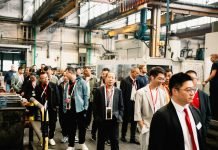Adroitec Information Systems, a provider of additive manufacturing (3D printed) products and solutions, hosted an open house at its facility in Noida from 11-12 September 2023. Focused on 3D printing-based services, the company is set to explore all industrial manufacturing avenues of the segment. The open house was aimed at explaining the advantages of 3D printing in various industry verticals.
A global consultancy and services company with development centers in India, Adroitec is owned by a US-based subsidiary of HOPE Consulting and aims to stay at the forefront of technology. Saksham Rastogi, senior applications manager at Adroitec, believes Adroitec is suited to be the right outsourcing partner. “At Adroitec, we aim to be all-encompassing for several industries. With 3D printing, the only limitation is the idea of how the technology can be implemented,” he said.

Adroitec’s differentiating factor is an overlay of solutions with customization, integration, deployment, and optimization. Adroitec has developed as a total application solution provider based on its experience and customization capabilities. “We integrate our experience and knowledge with leading-edge technologies to develop and deliver need-based solutions on both intra and Internet deployment. We have the support of our partner Stratasys, an American-Israeli manufacturer of 3D printers, software, and materials for polymer additive manufacturing as well as 3D-printed parts on demand,” Rastogi said.
Rastogi says the adoption in India is rather slow but only a matter of time. “3D printing technology will be part of a greater curriculum in the Indian manufacturing industries. The adoption is slow for now, but with the depletion of virgin resources, the necessity of alternative resources is getting clearer. The Indian printing and packaging industries are now considering 3D printing as a viable solution, especially in the signage and luxury packaging departments.”
Adroitec has been a supplier of medical equipment such as prosthetics, educational models of brain, heart, etc., drones, and surgical instruments to the pharma industries.

But with all the possibilities that additive manufacturing presents, production speed and energy consumption become its Achilles’ heel. “Integrating the technology is possible and easy. However, 3D printing is not as quick as printing something on a sheet of paper. Printing an object takes time and energy and that is what we along with our partners at Stratasys are trying to improve. With efficiency in energy and acceleration of printing speed, this technology will become one of the most usable and sustainable technologies that the Indian manufacturers are striving for.”











